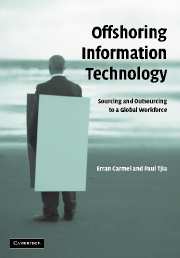Book contents
- Frontmatter
- Contents
- List of contributors
- Foreword
- Preface
- Acknowledgments
- Part I The fundamentals
- Part II Managerial competency
- 5 Offshore strategy
- 6 Offshore legal issues
- 7 Managing the offshore transition
- 8 Overcoming distance and time
- 9 Dealing with cross-cultural issues
- Part III Other stakeholders
- References
- End notes
- Index
9 - Dealing with cross-cultural issues
from Part II - Managerial competency
Published online by Cambridge University Press: 11 August 2009
- Frontmatter
- Contents
- List of contributors
- Foreword
- Preface
- Acknowledgments
- Part I The fundamentals
- Part II Managerial competency
- 5 Offshore strategy
- 6 Offshore legal issues
- 7 Managing the offshore transition
- 8 Overcoming distance and time
- 9 Dealing with cross-cultural issues
- Part III Other stakeholders
- References
- End notes
- Index
Summary
With more and more software professionals working in distributed teams across cultures, four computer science professors decided to study the impact of cultural orientations on performance. Computer science students from Texas and from Turkey were assigned into collaborative groups in a controlled experiment. Each of these virtual groups performed collaborative software design and programming. The professors evaluated the quality of the tasks at the end of the semester.
The researchers found that certain mixes of cultural orientations effected performance. If at least one of the members had a high power orientation the group's performance was less likely to be successful; if members had different destiny orientation scores the group's performance was less likely to be successful; finally, if at least one of the members had a high future orientation score the group's performance was more likely to be successful. (Each of these three orientations is explained in this chapter.)
Many software developers that we meet are relatively new to the topic of culture. They may have traveled and learned some of the superficial differences between some countries, such as greetings, but in order to become effective participants of global software development organizations, a deeper understanding is vital. The first two sections of this chapter serve as a mini-primer on this topic.
What is culture?
Culture, in the anthropological sense, according to Geert Hofstede, is the “collective programming of the mind distinguishing the members of one group… from another.”
Every adult is a member of many cultures.
- Type
- Chapter
- Information
- Offshoring Information TechnologySourcing and Outsourcing to a Global Workforce, pp. 175 - 196Publisher: Cambridge University PressPrint publication year: 2005



